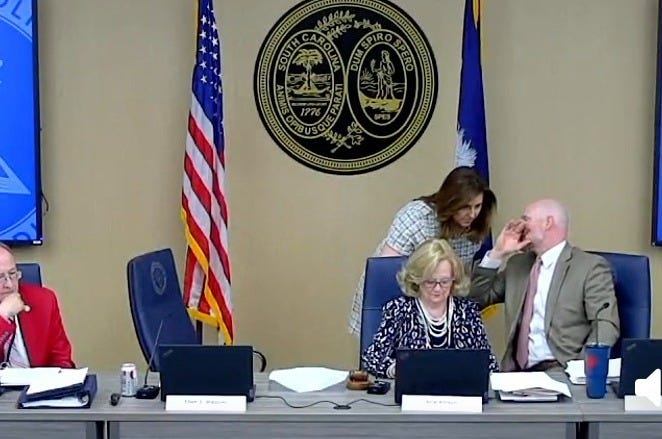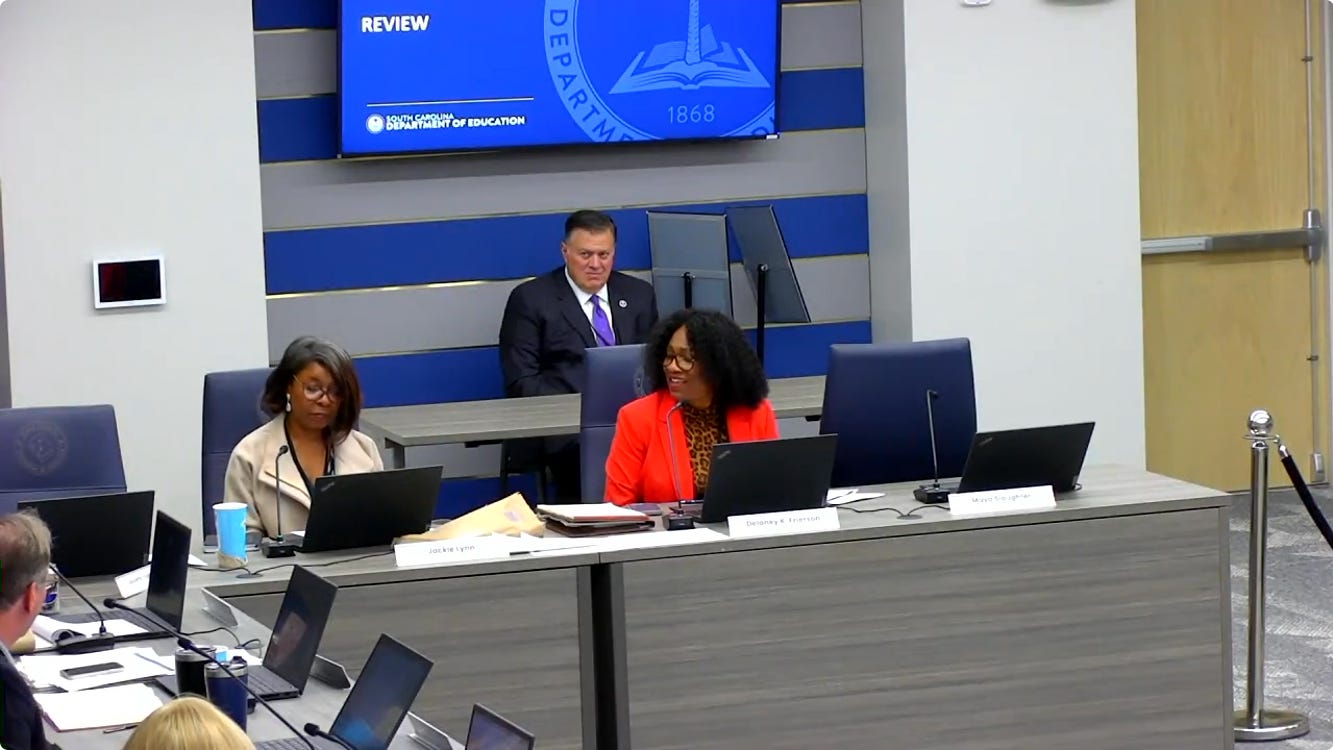Ten books escape banning in SC (for today)
For the first time, there was significant discussion and even dissent during a Full Board meeting considering book challenges.
This piece is brought to you by ProTruth South Carolina, and by paid subscribers.
There seemed to be a shift in the South Carolina Board of Education today. After some tentative votes from two board members last month against removing the books being challenged at that time, today saw the first significant debate since the passage of Regulation 43-170, which empowers the Board to remove titles from every South Carolina public school, before the start of the current school year.
The Board meeting started with several speakers (including myself) outlining the history of the regulation, from its introduction and passage to the current situation. (If you’re interested in my take, you can read my comments here.)
Mary Foster, a preschool teacher who works with Families Against Book Bans, told the Board, “You are not be required to consider a book as a whole or to explore how it might serve students, but your Board Rules of Governance charge you with advocating regulations that ‘enhance the learning environment in classrooms’”.
Tayler Simon, owner of the Liberation is Lit bookstore, drew parallels between recent attacks on diversity, equity, and inclusion programs and attacks on books that represent the diverse perspectives and experiences of South Carolina’s students.
Public comment was, somewhat predictably, followed by attorney Robert Cathcart, who seems to have had some role in crafting the language of the regulation, and who regularly attends Instructional Material Review Committee (IMRC) meetings to provide staff opinions on whether the committee should retain or remove books. Almost invariably, the committee follows his recommendations without discussion or debate.
Another Rushed, Perfunctory Book Ban Meeting
Correction: This piece originally stated that Superintendent Ellen Weaver spoke to the Post and Courier about book bans. In fact, Weaver was speaking at a meeting of the Steel Magnolias Republican women’s group.
Similarly, today Cathcart took to the lectern to explain away the concerns raised by many of us during public comment— including that the frequently-voiced concern that committee and Board had applied the prohibition against depictions of “sexual conduct” in books differently to different texts in a way that constituted “viewpoint discrimination”.
The Board, Mr. Cathcart said, had established “precedent” in the way it determined what a “description” of sex was.
Evidently, this “precedent” allows the Board to remove a book like Flamer, which does not show or describe any sexual acts, while retaining a book like 1984, which— while I don’t want it to be banned— contains lines like (content warning: violent sexual assault), ““He would flog her to death with a rubber truncheon. He would tie her naked to a stake and shoot her full of arrows like Saint Sebastian. He would ravish her and cut her throat at the moment of climax .” In fact, this was a line Foster read from 1984 during her own testimony, a line that has been shared with the Board and committee at least three other times, and it’s hard to understand any world where this doesn’t meet the regulation’s definition of sexual conduct, which includes, “an act or condition that depicts… the condition of being fettered, bound, or otherwise physically restrained on the part of the one so clothed”.
Cathcart’s explanation involved the claim that books like 1984 didn’t contain sufficient “adjectives” in their sex scenes to count as descriptions of “sexual conduct”.
Former Board Chair Dr. David O’Shields asked Cathcart if there was a way to find a middle ground where a books could be retained, for example for legal adult students only. Cathcart replied that the regulation prohibited any depictions of “sexual conduct” for use by any students.

It was somewhat surprising, given the usual processes of the Board over the past several months, that many of the Board members did not seem to fully accept Cathcart’s defense of the regulation this time.
O’Shields, a school district superintendent in Laurens, South Carolina, perhaps raised the most pointed concerns during the Board’s discussion of the ten challenged books.
After sharing an excerpt from a devotional about the power of words to “build up or break down,” O’Shields said, “In looking at this, it seems that we have 46 counties, and yet everything’s coming from one of them.”
He shared that he had spoken librarians in his own district, who were not seeing the issues the regulation was promoted as solving: many of the challenged books had already been removed, or weren’t in schools.
For example, he said Clinton High School only had five of the ten challenged books. One of them, Last Night at the Telegraph Club, had only been checked out three times since 2022, all by the same student.

He also said that the Board had a responsibility to serve all students, pointing out that many students might see themselves in books that he, personally, wouldn’t choose to read.

Other members of the Board voiced similar concerns, with member Ken Richardson (Horry) saying, “I love Columbia, especially when it comes to Gamecock football, but I don’t love driving to Columbia to hear about book bans.” Richardson also said, “I don’t think somebody from Beaufort should make me drive here from Myrtle Beach every meeting to talk about more books. My question is, when does this thing stop?”
“I am concerned about potential abuses of a process that we intended to be fair and equitable,” said board member Maya Slaughter (Calhoun, Dorchester, Orangeburg).
Why, some board members asked, was that “someone from Beaufort”—Elizabeth “Ivey” Szalai, author of over 90 complaints currently before the State Board, including complaints against all of the currently challenged books, and a member of Moms for Liberty according to a 2022 article— making decisions for districts across the state?
Some members said they supported the regulation initially, with the understanding that there was an underlying issue of books being used as “indoctrination,” but that in the months since it passed, they weren’t hearing complaints from their own areas.
Dr. O’Shields stressed that he had new issues with Szalai, herself, who was “wonderful person with a wonderful family,” but that “she and I just disagree, respectfully” on the topic of book bans.
Board member Jacqueline Lynn ultimately motioned “to postpone consideration for another time, of this action item”. Several Board members, including Frierson, moved to second the motion. Based on a voice vote, it seemed like all members voted in support of delaying consideration on the ten books; in any case, no member opposed the motion.
Unfortunately, this doesn’t permanently save the books from removal from SC schools; all of them could potentially be banned at a future date. But it did indicate that there was significant concern, across the political spectrum of the Board, about the language of the regulation and the way it was being implemented.






Soooo proud of my friend Tayler Simon!!!!!
Not directly related to South Carolina, but, following along a similar vein:
https://thequillandmusket.substack.com/p/jenny-donovan-and-the-hypocrisy-of?r=4xypjp